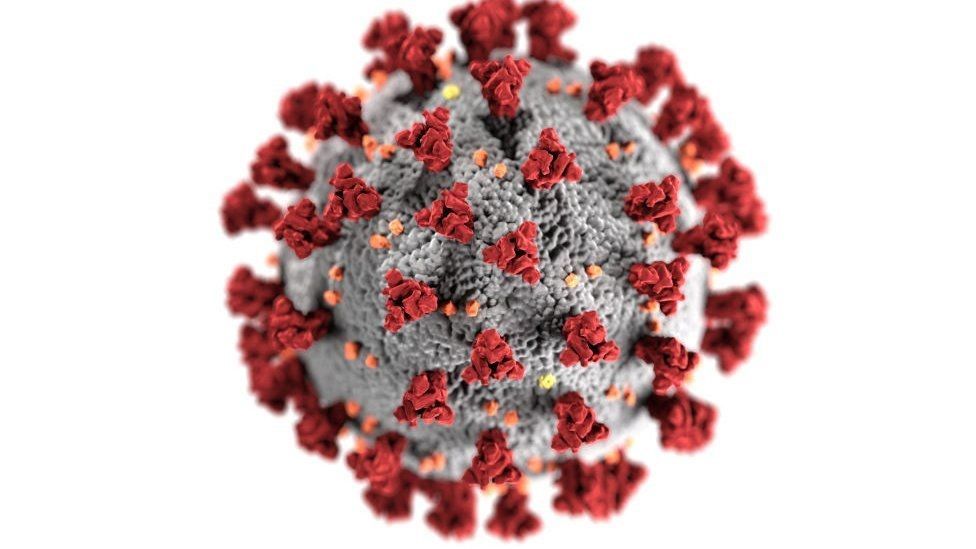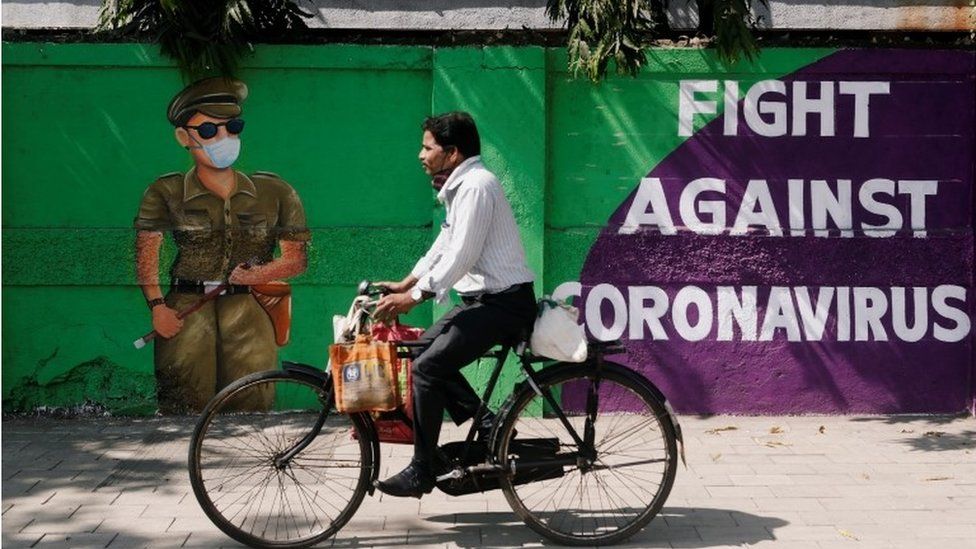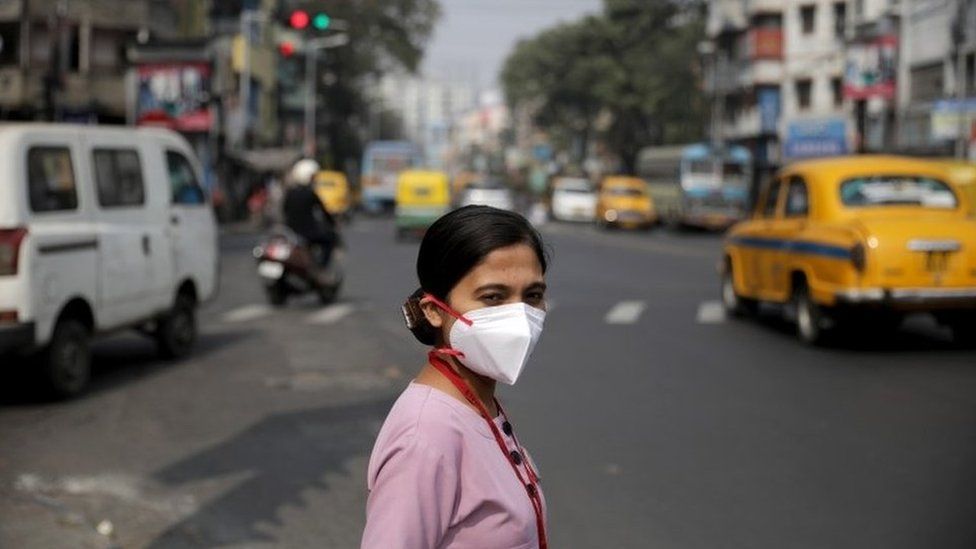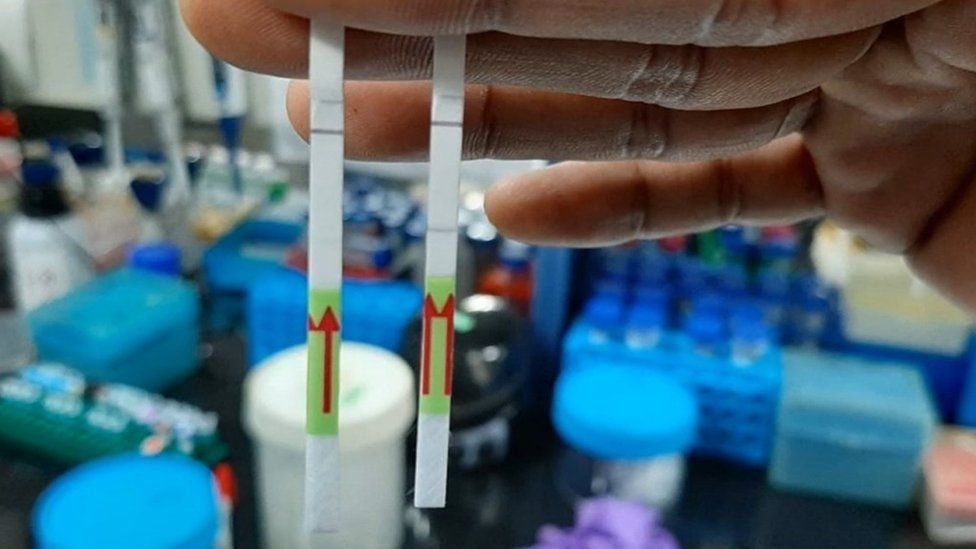Coronavirus: India hunts for new strains as Covid wave looms
 image copyrightGetty Images
image copyrightGetty ImagesLike all viruses, the coronavirus that has caused the deadly pandemic keeps changing in small ways as it passes from one person to another.
The vast majority of these mutations are inconsequential, and don't alter the way the virus behaves.
But some mutations trigger changes in the spike protein that the virus uses to latch on to and enter human cells - these variants could potentially be more infectious, cause more severe disease or evade vaccines. Such variants have been already identified in UK, South Africa and Brazil, and have now spread to dozens of countries.
Last week, a top US health official warned that the spread of highly contagious variants was threatening to fuel a "potential fourth surge of cases" in the country. The Brazil variant appears more contagious and may evade immunity provided by past infection, scientists say. The British variant is responsible for a chunk of new infections in US and Europe.
Genome detectives around the world are hunting down these worrying mutations. Scientists are able to detect changes by sequencing the genome of the virus after taking a swab from an infected patient. They crack the genetic code of the virus - essentially prising open its instruction manual - and begin tracking the mutations.
India was the fifth country in the world to sequence the genome of the novel coronavirus, isolated from its first recorded cases in the southern state of Kerala in January last year. Since then the country has recorded more than 11 million cases - just behind the US - and more than 150,000 deaths from the disease.
 image copyrightReuters
image copyrightReutersBut only now India is beginning to beef up what was a limited surveillance system to track the genetic histories of local samples of the Sars-CoV-2 virus, that causes Covid-19.
The timing is crucial: a clutch of states have reported an uptick in infections even as caseloads have fallen sharply in the country. Naturally, there have been fears that new variants of the virus might be the reason for the spike.
India says it has found 242 cases of the three foreign variants - mostly the UK one - in the population so far. Scientists say they are unlikely to be linked to the recent spike in infection, which is being largely attributed to people dropping their guard following the steep decline in cases.
But genome scientists are also "investigating" two variants found in samples in states like Maharashtra and Telangana which have seen a surge in infection rates. "We are collecting more samples from the field to investigate whether the two variants have any link with the surge. We cannot be complacent," Dr Sujeet Kumar Singh, director of India's National Centre for Disease Control, said.
In January, a group of genome scientists expressed concern in a paper that India "has so far not been sequencing" to full capacity, having deposited only about 6,400 genomes of the over 10.4 million recorded cases (0.06%)". Now a newly formed consortium of 10 genomic labs has been tasked to step up sequencing and report the results promptly.
 image copyrightEPA
image copyrightEPA"We need to constantly monitor and make sure none of the variants of concern are spreading in the population. The fact that it is not happening now doesn't mean it will not happen in the future. And we have to make sure that we get the evidence early enough," Dr Shahid Jameel, a leading virologist, said.
That is why genome sequencing matters. For starters, India has budgeted $14m (£10m) to boost sequencing efforts. The aim is to sequence 5% of all samples that have tested positive through the gold standard PCR (Polymerase Chain Reaction) tests - which isolate genetic material from a swab sample - and have a high viral load. "It is a doable target," says Dr Anurag Agarwal, director of the Delhi-based Institute of Genomics and Integrative Biology (IGIB), a leading genomic lab.
In the last 10 months, India has sequenced more than 6,000 coronavirus samples from 22 states to find out more about how the virus is changing in the population. (The overwhelming majority contained a single variant of the virus which was probably brought by travellers from Europe.) More than 7,600 mutations have been recorded, "most of which are of no consequence," according to Dr Rakesh Mishra, director of the Hyderabad-based Centre for Cellular and Molecular Biology (CCMB).
More mutations of the virus have been found in Bangalore than in any other city, according to researchers from the Indian Institute of Science. Researchers say this suggests that the virus is now mutating faster than before - three strains identified in Bangalore had 27 mutations in their genomes with over 11 mutations per sample, more than both the national average (8.4) and global average (7.3).
It's not easy to sequence at scale in a vast and diverse country like India.
Labs have to pick up samples locally. There are different platforms with differing levels of automation for the job. Reagents are expensive and have to be imported. Freezers store samples, and machines map the genomes. Sequencing a sample can cost up to $75. Samples have to be collected by trained personnel, stored in special containers, and shipped to labs across the country. States like Kerala do it better than others: it sends 25 samples from each district every week to a genome sequencing lab in Delhi.

Usually it takes up to 48 hours to sequence a sample. But if you have to sequence samples of international travellers who have been kept in isolation, you need to do it quicker. Dr Mishra says his lab has figured out a way to identify a specific variant in 24 hours without completing the entire sequence.
Prof Ravindra Kumar Gupta, a Cambridge-based virologist, says "sequencing is highly desirable to understand what is going on" with the coronavirus. However, he wonders whether economies like India which spend little on healthcare should be diverting resources to ramp up sequencing. "I think sequencing is important. But the most important thing would be to vaccinate more people," he told me. "Sequencing by itself doesn't save many lives or change policy."
But as India enters, in the words of Health Minister Harsh Vardhan, the "endgame of the pandemic", the hunt for variants has been intensified. "India is in a good position. Cases and deaths are low, hospitals are not overwhelmed, vaccination is picking up speed," says Dr Mishra.
"The only thing that can disrupt this is a dangerous new variant, which could be even be homegrown."

Read more by Soutik Biswas



No comments